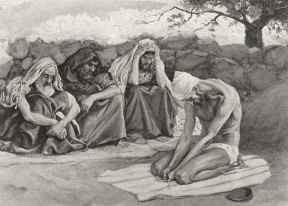 Psalm 88 is one of those unique psalms that leave the reader hanging. At the outset is the proclamation: “Lord, you are the God who saves me;” but, it quickly bores down into the pit of despair. I would suggest that it is when the reason for despair is assessed, that is when healing can begin.
Psalm 88 is one of those unique psalms that leave the reader hanging. At the outset is the proclamation: “Lord, you are the God who saves me;” but, it quickly bores down into the pit of despair. I would suggest that it is when the reason for despair is assessed, that is when healing can begin.
This is one of those psalms where you keep waiting for the u-turn where the author realizes that his words are getting dark and kind-of scary so he quickly remembers the Lord’s faithfulness and ends on a positive note.
Not so with this psalm. This one does not come up for air or let up in its descent. Note the final words: “darkness is my closest friend.” It is not one that we would find in a hymnal or in our worship service: “Turn in your hymnals to Psalm 88.” I don’t think so!
So, what is the purpose of such a psalm?
My takeaway is that this psalm recognizes that we sometimes face situations in life that are truly without remedy, that press our coping skills beyond their limits and that defy solutions. It is at times like this that we need to assess the extent of the damage and the harm that has been done. It is a time when we evaluate our own role in the circumstances and face them head-on. Our own emotional reactions–and the reactions of those around us–also need to be confronted and appreciated.
It is a time to face the truths of life without platitudes, flippant analyses or dream-world denial.
As a coping skill, denial is an important tool for buffering us from the harshness of sudden calamity or devastating, sudden loss. But, at some time, the stark reality must be confronted and processed as our coping skills and our core beliefs and principles are tested and preparing for the arduous road ahead.
Friends and family often feel uncomfortable with those realities as well and they empathize enough to know that they wish to make the suffering get better or go away. So, simple platitudes such as “it will all work out” and “look on the bright side” are almost hurtful, in spite of the best of intentions. It is at times like this that people feel the need to offer unsolicited advice or counter-intuitive remedies that worked for their uncle or that they read about in the latest tabloid.
There comes a time, however, when you simply have to call a trusted friend to let them know to check in on you at the end of the day. It is a time to deal with the reality. So, you lock the door, turn off the phone, pull the shades, call in sick and bury your face in a pillow, screaming at the top of your lungs or punching the daylights out of a punching bag.
It is a time when we are vulnerable to old vices that may seem to offer temporary relief, but, in the end they just delay and prolong the agony.
It can be a dangerous time when we just feel like giving up…
…but, it is an important time.
That’s when passages like Psalm 88 are important. Passages like this give us permission to grieve, to mourn and to complain about our circumstances. They open the door to an honest dialogue with God about our pain; He’s big enough to take it. The book of Lamentations is another helpful tool as the prophet Jeremiah weeps over the devastation of the glorious city of Jerusalem. Chapter 3 is especially helpful.
Then there are passages like Psalm 22 and its obvious connection to the crucifixion and the sense of betrayal, abject humiliation, suffering and emotional pain. With these passages we realize that, indeed, we are not alone.
The truth is that in our culture of pills for pain, marketing gimics that offer miracle cures for every ache, and la-la-land advice for complex, intractable, chronic problems, there are not many places for the lament and sorrow that comes with suffering. So many are forced to heal alone, realizing that no one around them truly understands while others wonder when they are going to “move on” and “get over it.”
How many times these occasions in life truly communicate to us who our real friends are…. When Job faced the ultimate in calamities  in a short period of time, his three friends joined him in the book of Job, chapter 2:11-13:
in a short period of time, his three friends joined him in the book of Job, chapter 2:11-13:
11 When Job’s three friends…heard about all the troubles that had come upon him, they set out from their homes and met together by agreement to go and sympathize with him and comfort him.12 When they saw him from a distance, they could hardly recognize him; they began to weep aloud, and they tore their robes and sprinkled dust on their heads. 13 Then they sat on the ground with him for seven days and seven nights. No one said a word to him, because they saw how great his suffering was.
Seven days of compassionate silence is almost impossible today in our hurried culture of simple solutions to complex problems. But, I would maintain, Jobs friends did their best work when they joined him in his suffering and resisted the normal temptations to help. It was when they opened their mouths to fix him that God, Himself, judges their actions and acknowledges Job’s example. Had they allowed Job’s lament to stand on its own in chapter three, joining him in his anguish and sorrow, perhaps they could have actually been helpful. In chapter four, however, based upon their assumption that God does not allow bad things to happen to good people, they begin to answer the “Why?” question by assuming that Job must have done something terribly wrong. How else could such calamity happen to this man?
The truth is that there is no perfect life insurance plan that can rule out the horrible things that can happen to people, good or bad. In other words, while faith in God does promise a better life, it is not a guarantee for a trouble-free life. There are times when ‘better’ has to be understood in the midst of great tragedy and suffering and the challenge to juxtapose those realities together is where faith becomes real.


 admonition makes sense as one crosses the fine line between competence to incompetence. Dirty Harry remarks frequently about the incompetence he sees in his superiors making for some great one-liners.
admonition makes sense as one crosses the fine line between competence to incompetence. Dirty Harry remarks frequently about the incompetence he sees in his superiors making for some great one-liners. Building a house that will last is based upon unyielding structural requirements that begin with the foundation. In a similar way, a happy home depends upon certain unyielding structural requirements, anchored upon a foundation of unconditional love, clear boundaries with freedom to explore and solid principles that will stand the test of time.
Building a house that will last is based upon unyielding structural requirements that begin with the foundation. In a similar way, a happy home depends upon certain unyielding structural requirements, anchored upon a foundation of unconditional love, clear boundaries with freedom to explore and solid principles that will stand the test of time. Psalm 88
Psalm 88 in a short period of time, his three friends joined him in the book of Job, chapter 2:11-13:
in a short period of time, his three friends joined him in the book of Job, chapter 2:11-13:





